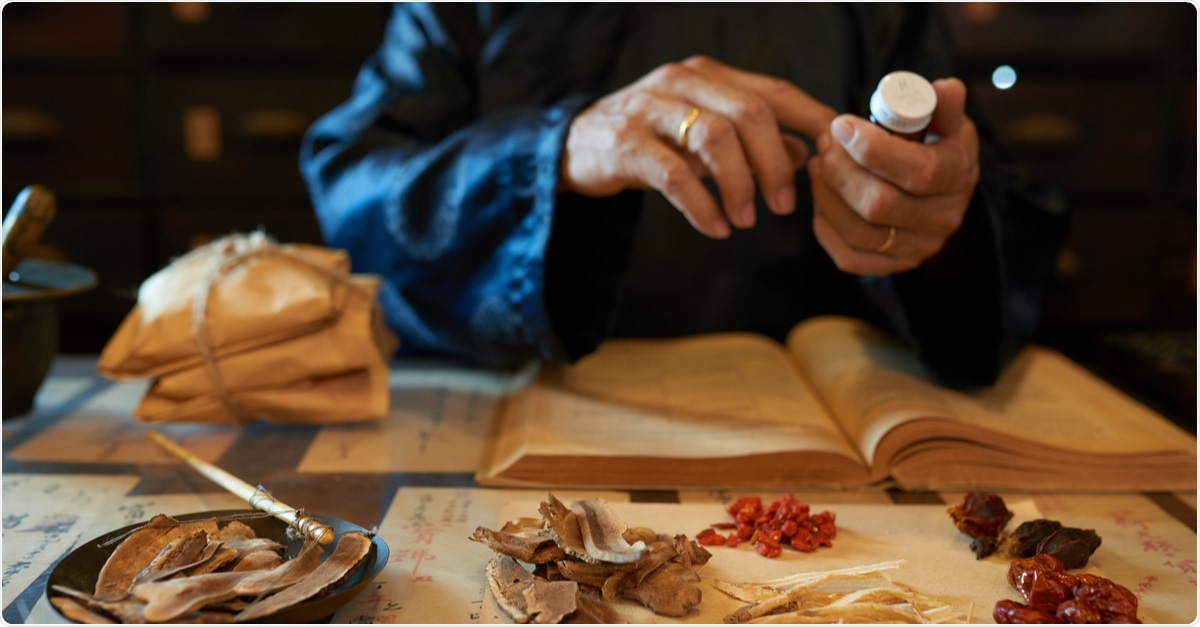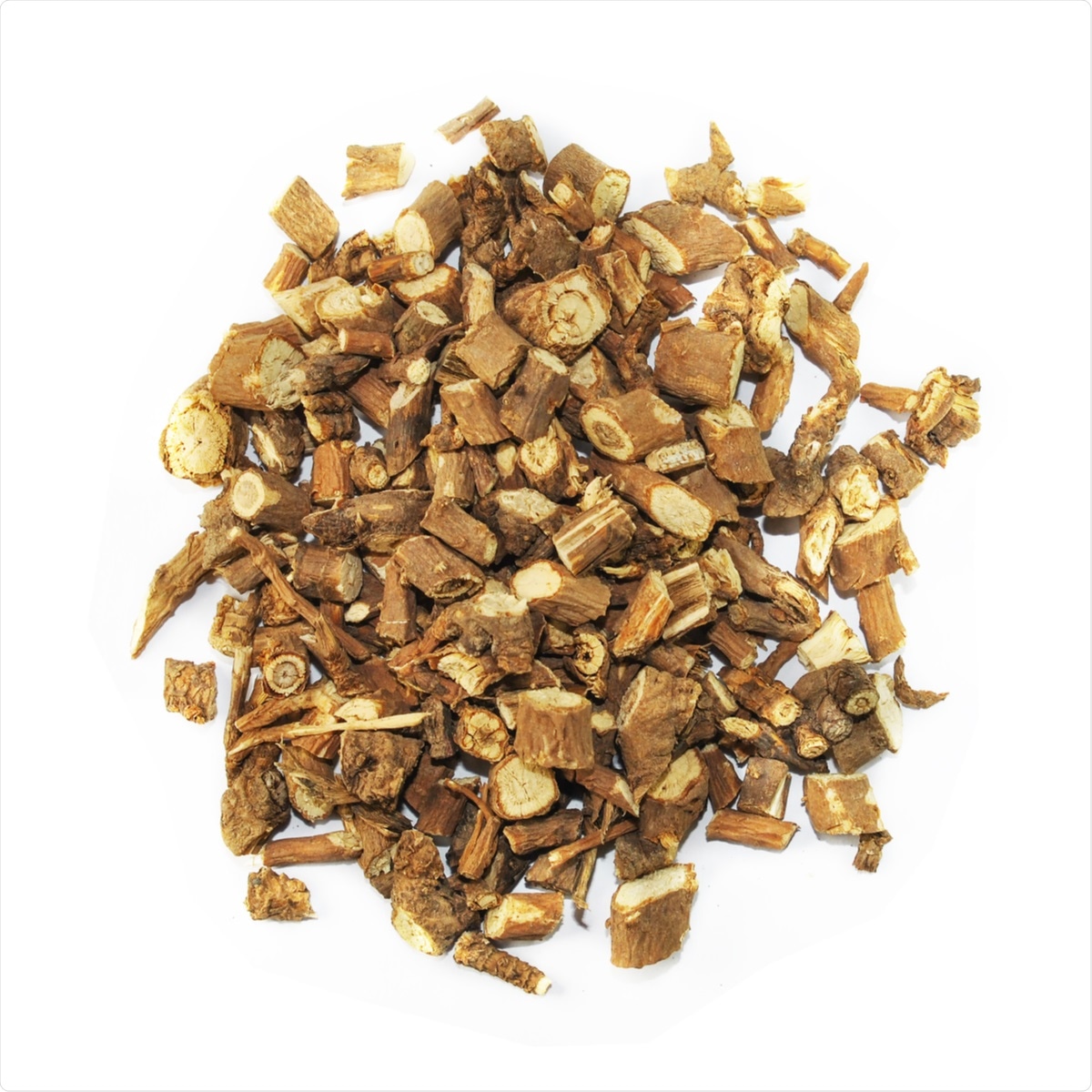Using computational methods, a team of researchers identified three compounds in traditional Chinese medicine that could be used against SARS-CoV-2: quercetin, puerarin and kaempferol. Of the three compounds, quercetin showed the highest binding affinity to both the ACE2 receptor and the receptor-binding domain of the SARS-CoV-2 spike protein, and could thus provide a dual synergistic effect.
The severe acute respiratory syndrome coronavirus 2 (SARS-CoV-2), the causative pathogen of the ongoing coronavirus disease 2019 (COVID-19) pandemic, infects human hosts by binding with the human angiotensin-converting enzyme 2 (ACE2) receptor on their cells, notably the epithelium lining the respiratory tract. The receptor-binding domain (RBD) of the coronavirus spike protein binds to ACE2 followed by membrane fusion to the host cell, thus allowing the virus to infiltrate the cell and commence replication.
Traditional Chinese medicine, widely used for many diseases, showed therapeutic effects during the 2003 SARS-CoV epidemic. The RBD of the SARS-CoV-2 has significant structural homology with SARS-CoV. Although the use of Chinese herbs with modern medicine has shown benefits in COVID-19 patients, several components are present in the herbs and have complex interactions, making it challenging to uncover the molecular mechanisms responsible for its therapeutic effects.

Several computational studies have helped predict active compounds in the medicinal herbs with the potential to accelerate traditional medicine-based drug discovery.
Finding potential compounds against SARS-CoV-2
Researchers from various institutions in China used computational analysis to discover potential molecule candidates against SARS-CoV-2 infection. Using the Traditional Chinese Medicine Pharmacology database, they screened for molecules that could target ACE2.
They identified the compound puerarin that could target ACE2. Then, they screened for Chinese herbs that have this compound in the database and found five. Furthermore, since it is thought that compounds in the same herbal medicine have synergistic properties, they expanded their search to include all the compounds in the five herbs to arrive at 41 compounds.
Upon analyzing which compounds were present in the maximum number of herbs, they found puerarin was present in all the five herbs, and quercetin and kaempferol were present in three herbs. Next, they predicted potential drug targets of the selected compounds using the database, leading to 240 possible targets. Upon further analysis, they selected puerarin, quercetin, and kaempferol for further study.
Next, the authors performed molecular docking analysis to determine potential binding sites and binding affinity to ACE2. All the three compounds could bind on the same region of ACE2, which is located some distance from the binding position of SARS-CoV-2. It is likely the compounds are causing changes in conformations rather than competing with the spike protein to bind to ACE2. Quercetin had the highest binding affinity, forming both strong and weak hydrogen bonds.

They also experimentally determined the binding of the three compounds to ACE2 using surface plasmon resonance. Similar to the theoretical analysis, they found quercetin had higher binding affinity to ACE2 than puerarin. They also observed that puerarin affected the binding of spike protein to ACE2, and quercetin almost completely disrupted the spike protein binding to ACE2. Molecular docking analysis showed that quercetin has high binding affinity to the spike protein. Using pathway enrichment analysis for the COVID-19-related genes, they found quercetin affected the immune-modulation and viral infection activities.
How the compounds affect SARS-CoV-2
All the three compounds tested were found in the herb Radix Bupleuri confirming that compounds in a single herb have synergistic pharmacological properties. The herb is popular in China and has been used to treat flu, inflammation, malaria, and hepatitis B. It is also one of 26 Chinese herbal medicines advised by traditional Chinese medicine practitioners to combat COVID-19.

Puerarin has been approved for use in China for decades and could be an ideal drug repurposed for its antiviral properties. Although its binding affinity is lower than quercetin, it has a safe dose limit of about 0.5 gram, so it could be used at a high dose to achieve a suitable antiviral effect. It also has beneficial effects on fever, cardiovascular disease, and neurological dysfunction, so it can also be used as an adjuvant to help improve COVID-19 symptoms.
Quercetin showed a higher binding affinity to both ACE2 and the RBD of the spike protein. The dual binding effect of quercetin could therefore be synergistic and provide a strong antiviral effect against SARS-CoV-2. Furthermore, since analysis suggested that quercetin could affect immunomodulation, and because studies have shown patients with severe COVID-19 disease tend to experience cytokine storms, quercetin could help alleviate symptoms in such cases.
"traditional" - Google News
November 23, 2020 at 06:23PM
https://ift.tt/3nPKoyk
Compounds in traditional Chinese medicine herbs may inhibit SARS-CoV-2 infection - News-Medical.Net
"traditional" - Google News
https://ift.tt/36u1SIt
Shoes Man Tutorial
Pos News Update
Meme Update
Korean Entertainment News
Japan News Update
Bagikan Berita Ini














0 Response to "Compounds in traditional Chinese medicine herbs may inhibit SARS-CoV-2 infection - News-Medical.Net"
Post a Comment